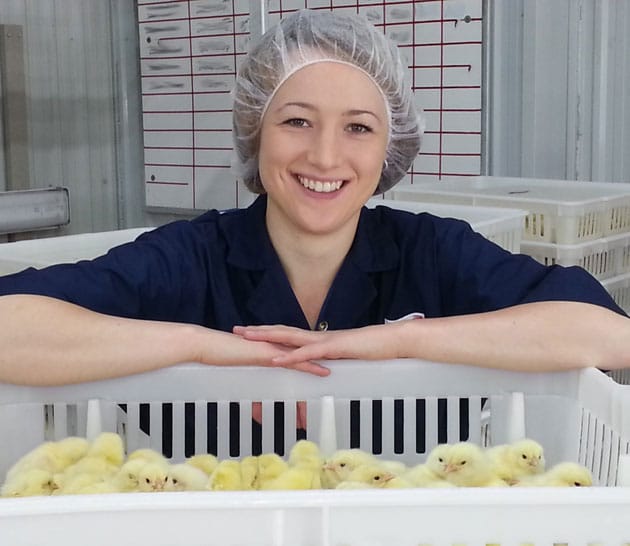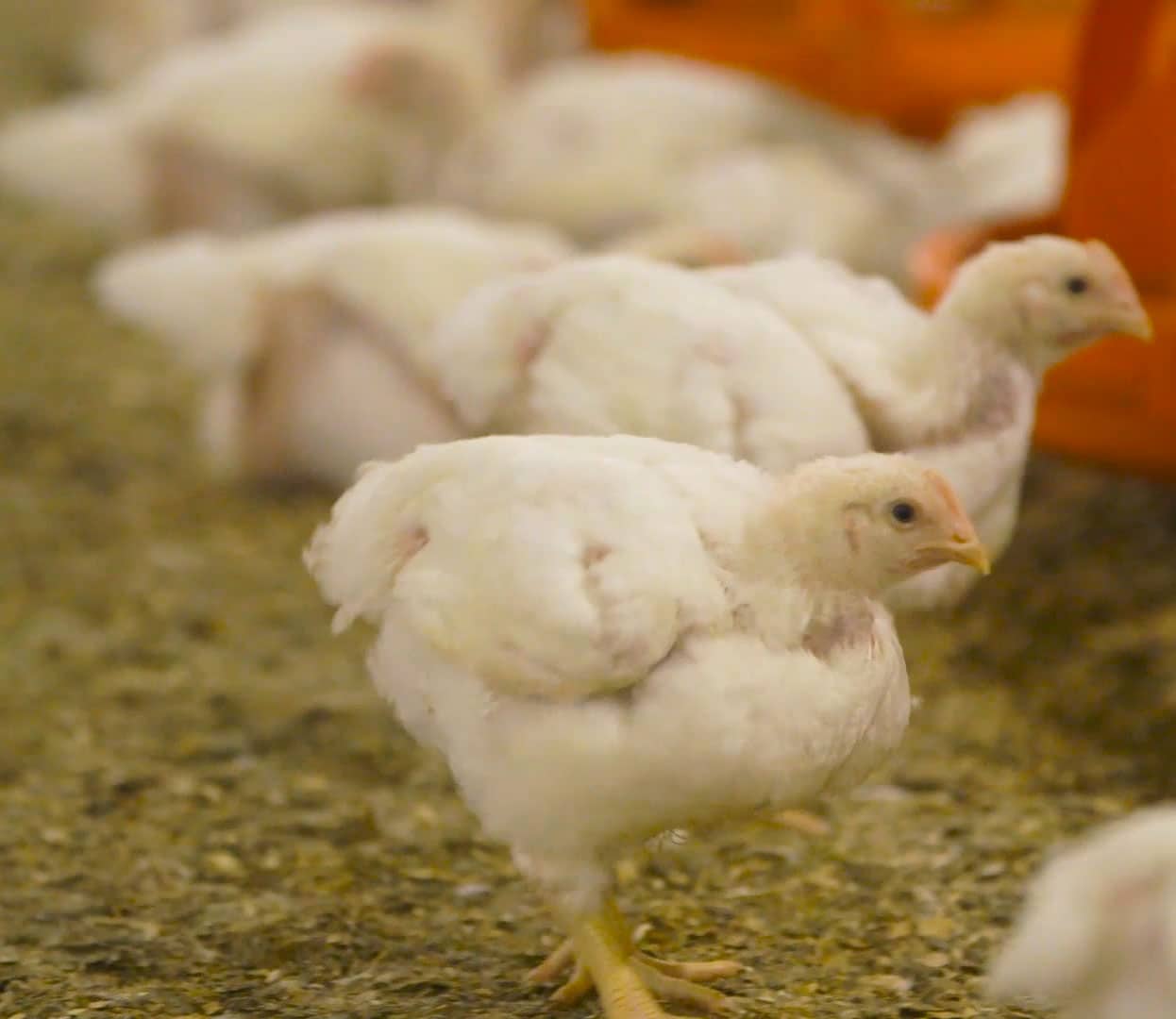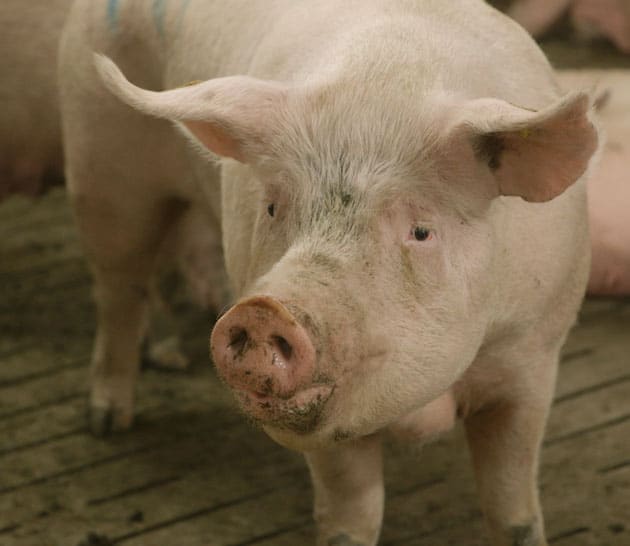Antibiotics Only When Our Animals Need It
Experts agree that antibiotic overuse is an urgent public health problem. That’s why we commit to treating our animals only when necessary to prevent or minimize suffering and to prevent the spread of a disease to other animals.


We only use antibiotics when we truly need them
Our experience tells us that we can reduce the use of antibiotics through excellent preventive
veterinary care, and that’s why we are one of Canada’s largest provider of poultry Raised Without
Antibiotics. We’re proud to be the largest producer of Raised Without Antibiotics poultry in Canada as
we’ve reduced our antibiotic usage by 99.31% across our pig operations since 2014.
About our Raised Without Antibiotics program in our poultry operations
We run the largest Raised Without Antibiotics program in Canada. We focus on providing excellent management, health and nutrition to our animals to maintain health and prevent the need for antibiotics.
Should any flock in our program become sick, we consider all treatment options. We rely on veterinarians to decide if antibiotics are needed and to select the best medication for the condition, when necessary. After antibiotics clear a treated animal’s system, that animal enters a different production channel. These products are safe, wholesome, and free of any remaining antibiotics, but do not bear a Raised Without Antibiotics claim.


How we’re raising our animals without the use of antibiotics
The facts
- We’re among the largest producers of Raised Without Antibiotics pork in North America.
- We’re the largest producer of Raised Without Antibiotics poultry in Canada
- We’ve reduced our antibiotic usage by 98.9% across our pig operations since 2014.


Antibiotic use in our pork operations
Successfully raising animals without antibiotics is a team effort. Our veterinarians and technical service experts train our farmers in practices that maintain health and prevent disease. We provide our pigs with specialized feed and water programs, high levels of biosecurity and strong vaccination programs. And when our animals do get sick, we treat them promptly and use antibiotics only when necessary.
Animals in our Raised Without Antibiotics program never receive any antibiotics and we are proud to be among the largest producers of Raised Without Antibiotics pork in North America.
Q&A
Answers to your questions about antibiotics in the animals we raise:
Why are antibiotics used in farm animals?
For the same reason they are used in people and pets: to treat and control diseases. They must be used responsibly, however. To be safe, we strictly limit the use of antibiotics that are medically important to humans when we select an antibiotic for use in our animals. Antibiotics are only used under the direction of a veterinarian, and we work closely with our industry partners to reduce the use of antibiotics.
Are there ways to treat sick animals or birds without using antibiotics?
We are constantly looking for ways to reduce the use of antibiotics. This includes developing strategies to reduce illnesses on our farms, adopting more comprehensive vaccination programs to prevent diseases, use of non-antibiotic health and nutritional products, and enhancing our biosecurity to reduce exposure to disease.
What is antibiotic resistance?
Antibiotic resistance occurs when bacteria develop the ability to survive treatment with an antibiotic that is normally expected to slow their growth or kill them. Antibiotic resistance is a natural process. However, overuse or improper use of antibiotics greatly speeds up its development. Resistant bacteria are a human and animal health concern because infections with these bacteria are more difficult to treat.
What is antimicrobial stewardship?
Antimicrobial stewardship refers to the judicious use of antibiotics to limit antibiotic resistance development and preserve their effectiveness. There are many types of antimicrobial stewardship programs and policies used in both animal health and human health settings.
Programs implemented by the Chicken Farmers of Canada and Turkey Farmers of Canada to limit use of antibiotics important to human medicine are a great example of antimicrobial stewardship in action!
Are antibiotic residues in meat and poultry a public health concern in Canada?
Government data shows they are not. When animals are treated with antibiotics, farms must allow sufficient time for the medication to clear the animal’s system before it is processed for food.
Veterinarians and farmers must keep records to verify that this withdrawal period has passed. Food inspectors monitor meat and poultry for the presence of antibiotic residues, and government data shows that residues are not an issue of concern in Canada.
If you can raise some animals without the use of antibiotics, why can’t you raise all animals without antibiotics?
Just as people get sick from time-to-time and require antibiotics, so do animals. Withholding antibiotics if an animal truly needs them to fight an infection is simply inhumane. We do our best to raise our animals in ways that minimize the need for antibiotics, but it’s simply not possible to prevent the need in every case.
Meat and poultry from animals who have never received antibiotics can bear the claim “Raised Without Antibiotics” (RWA). Meat and poultry from animals who are treated with antibiotics and later processed for food, after the withdrawal period has passed, enter what is called the “conventional” supply and do not bear an RWA claim.
How do you ensure antibiotics are used responsibly?
Veterinarians play an essential role in ensuring responsible antibiotic use, and medically important antibiotics are only allowed to be given to food animals under the prescription of a veterinarian. They determine when antibiotics are truly necessary to treat animals or flocks and they choose the most appropriate antibiotics.
In most cases, we use different antibiotics for animals than we use for people. When an animal’s condition requires an antibiotic that is also medically important in human health, veterinarians seek all possible alternatives before prescribing.
Veterinarians also ensure that the necessary withdrawal period has passed before an animal may be processed for food. This ensures that no residue remains when the animal is processed.
Do you use hormones or other growth promoters?
Hormones are not allowed in pig and poultry production in Canada. Maple Leaf Foods never uses hormones or any other type of growth promoter in our pig and poultry production.
Animal Care Performance Report
We’re documenting our animal care goals and measuring our progress. See how we’re doing in our 2024 Animal Care Performance Report.
Integrated Report
We’re documenting all the changes we’re making. See our progress in our latest Integrated Report.
